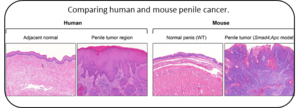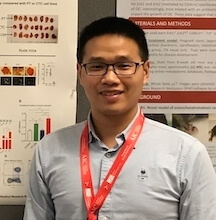
Penile squamous cell carcinoma (PSCC) although rare in the US, contributes to a larger proportion of cancers in countries with developing economies. A major barrier has been the lack of a good animal model to better understand and develop treatments for the disease. In a paper published in Nature Communications https://www.nature.com/articles/s41467-020-15980-9.pdf, Dr. Lu with first author Dr. Tianhe Huang and others from the lab team reported the creation of a much awaited mouse model of PSCC.

They used genetically engineered mice to show that PSCC develops due to the activity of (i) a transcription factor SOX2 that controls cell proliferation and (ii) a second gene COX2 that increases inflammation, and both together drive formation of highly aggressive tumors that appear to be very similar human tumors. Further, PSCC in the mouse is resistant to antibody immunotherapy currently being explored to treat human disease. But using antibody- with cell-based immunotherapy was highly effective, suggesting a potential new combination treatment. The key collaborators were Dr. Curtis A. Pettaway at The University of Texas MD Anderson Cancer Center and Dr. Magaly Martinez Ferrer at University of Puerto Rico. The work was supported by an NIH/NCI U54 grant.
